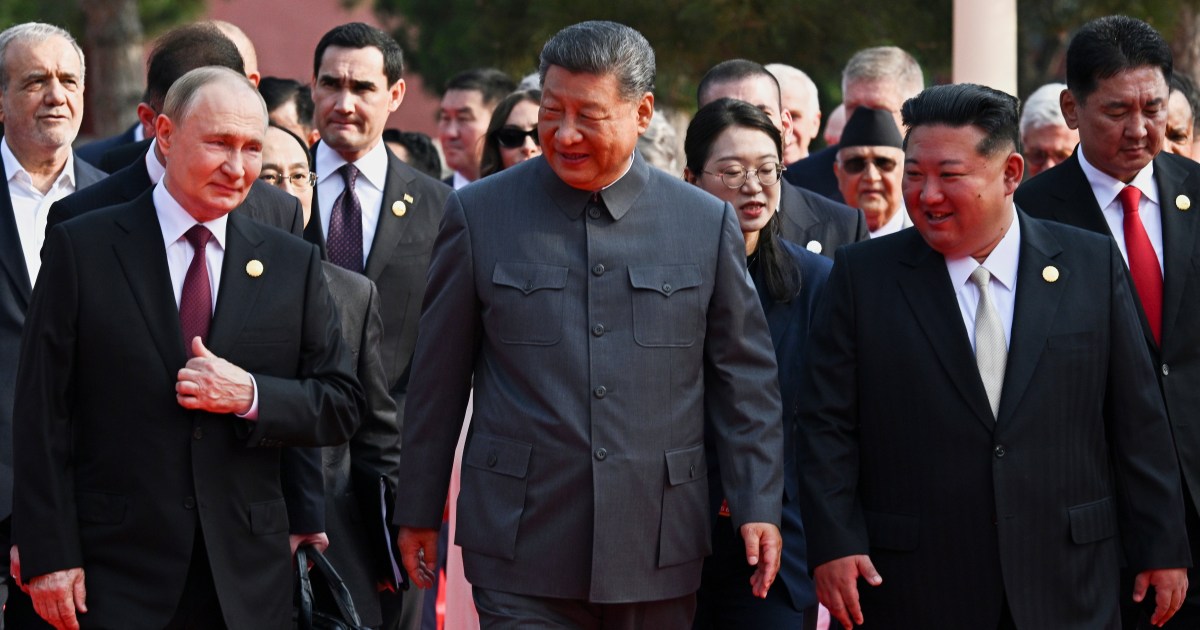Fouad Abu Youssef, 34, tries to find a change of clothes for his five-year-old daughter Layla in the Holy Family Church in Gaza City while wading through a pile of used clothing.
Fouad, a member of Gaza’s small Christian minority, has seen his own home and his family’s home collapse in the Tal al-Hawa neighborhood of Gaza City over the past two years of Israel’s war on Gaza. Fouad, his elderly parents, and five of his five siblings were forced to live in a nearby cemetery before finding refuge in the church as the situation escalated.
The Abu Youssef family has resided in the Zeitoun neighborhood of the church for more than a year. When an Israeli tank shell struck the church in July, killing three people and injuring several others, they were spared. The family is now worried about losing the roof over their heads once more and returning to the streets, where it is even more dangerous, after Israel last week announced it was planning a major assault on Gaza City and called it a “dangerous combat zone.”
The other churches in Gaza City, including the Greek Orthodox Church of Saint Porphyrius and the Anglican St. Philip’s Church, were not placed by Israel in the areas designated for expulsions. However, the nearly 550 displaced people who are staying in the Holy Family Church still have reservations about Israel’s military. Despite Israeli assurances that it does not target places of worship, the church has already been attacked numerous times.
Even if Israel orders them to evacuate in the coming days, the majority of the people there, including Fouad, are refusing to leave. The other churches, where the majority of the residents have chosen to stay despite being told by Israel to move south, share this sentiment.
In a joint statement released on August 26, the Christian leaders of Gaza declared that the forced displacement would be “nothing less than a death sentence.”
Many of the people who have sought shelter within the compounds have been subjected to the hardships of the past few months are weakened and malnourished, according to the patriarchs. The clergy and nuns have chosen to remain and take care of all those who will be in the compounds for this reason.
Clergy to remain in their churches
The Holy Family Church’s spokesperson, Farid Gibran, stated that those who are sheltering at the church have the right to leave if they so choose.
Many of those attending the Holy Family Church are staying in Gaza City despite growing concerns about Israeli attacks. Many people, including Moussa Saad Ayyad, a 41-year-old father of four children between the ages of six and 14, think relative safety might be assured by the church’s relationship with the Vatican.
We visited the church because it feels like the only place left where we can be together and get help. He told Al Jazeera, “Our ties abroad provide some protection.” Each of us may have no choice but to flee south on their own if the danger worsens, the author says.
He prevents others like Fouad from leaving because of the pressure it would put on his daughter and his elderly parents. He also thinks that staying is a moral deed and a form of resistance to the Israeli occupation, which has already cost him a lot.
As he watched his daughter sleep, Fouad said, “They took my home and my loved ones, but they won’t take my right to remain here on my land no matter how dark it gets.”
Church leaders inside the complex claimed that the church has not pressed occupants to stay, and that both Christian and Muslim refugees are working fervently to ensure the elderly and children’s safety.
Because he was not authorized to comment, a priest said the Christian community in Gaza has a significance that goes beyond its small numbers.
He told Al Jazeera, “Our presence in the church] demonstrates centuries of historical continuity in this country.” In the midst of darkness, “we are here to pray, to serve, and to bear witness to hope.”
A secluded retreat
Since Israel’s initial ground operation announcement last month gripped residents of Gaza City, they have been ensnared by fear and uncertainty. He and his family have been sheltered by the church for 23 months, but he is reminded of incidents like the July attack when even that level of safety was not guaranteed.
Pope Leo XIV expressed his deep regret at learning about the loss of life and injury caused by the military attack, according to the Israeli military, and claims that the building was the victim of stray fire.
Moussa is unsure of what is safest for his children, if anything, as Israel continues to pursue its military operations in Gaza City.
An Israeli sniper shot two women inside the church compound in December of that year, and the building was in flames as early as December 2023.
The parish complex had been ruined by an airstrike that day, destroying solar panels, tanks, and other structures.
We lead normal, balanced lives in Gaza before the war started, according to Moussa, “basic human lives with basic needs met.”
Father of three Samer Farha felt the same way.
He told Al Jazeera, “Seeing our children go hungry is the hardest thing we’ve ever experienced.” The bombing’s sound makes every moment heavy, but we make an effort to make them feel safe.
The Holy Family Church’s parish priest, Father Gabriel Romanelli, described the leadership’s and their decision to remain as “preserving the church as a place of worship and life.”
Romanelli, who was hurt in the July attack and is still recovering, told Al Jazeera, “Remaining represents more than defiance for these refugees.” The preservation of a place that embodies the history of their community is symbolic.
Beyond Gaza, the only Catholic parish in the country has a long history of symbolic significance. The late Pope Francis called the parish almost daily throughout the conflict, keeping a direct line to the besieged area.
Theophilos III, the Greek Orthodox patriarch, and Cardinal Pierbattista Pizzaballa, the Latin patriarch of Jerusalem, traveled to Gaza in July to get medical and food supplies.
Even if it means passing away.
The Holy Family Church is one of Gaza City’s last Christian sanctuaries as the people who have fled the city begin to evacuate.
After her home in Tal al-Hawa was destroyed, Maryam al-Omr, 69, told Al Jazeera, “I will not leave here, even if it means dying.” I’ll never leave this place because it’s my last home.
Yet for every stalwart, including al-Omr, others are making an impossible choice.
One displaced resident who contacted us over fear of being taken advantage of his departure said, “We’re grateful for the international statements. However, there are still food, medicine, and fuel shortages. More than just words, we need.
The Holy Family Church, which was founded in honor of Christianity’s original refugees who fled violence in ancient Palestine, now provides housing for families who must choose between safety and home as night falls and Fouad prepares his family’s sleeping area.
His daughter cries from hunger, and he holds her close, switching between wanting to leave and staying and whispering comfort.
As he admits, “I don’t want anyone to see my pain,” his voice sags. Get me away from this place.
He then reiterates his unwavering commitment to the church, “We will stay here, whatever comes,” leaning on one of the walls.





